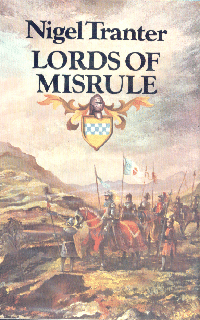

![]()
![]()
![]()
![]()

![]()
It might have seemed a major improbability that the House of Stewart would ever maintain the rule of Scotland, much less the eventual United Kingdom. The Stewarts were not the loftiest, richest or most powerful family in the land, nor yet the foremost warriors or statesmen. Moreover they were a house divided if ever there was one. In the vital fourteenth-century most of the Stewarts hated each other and made no secret of the fact - and with the Douglas power in particular to contend with, that ought to have assured their fall. But they had an astonishing selection of talents amongst them, including a genius for survival - and, many said, the luck of the Devil himself. Descendants of the Bruce's daughter, they only heired the throne by chance - and kept it by mischance, not a few of their subjects asserted.
The Scots always required strong kings, and the early Stewarts failed to provide them. Into the consequent power-vacuum there was no lack of strong men to pour, Douglases pre-eminently. When the chief of these, the second Earl thereof, was slain at the battle of Otterburn -of Chevy Chase as the English named it - and foul play was alleged, amongst the suspects the name of Stewart stood out.
Not the old King Robert the Second, Bruce's grandson, feeble, weary and half-blind, but his tribe of tearaway sons legitimate and otherwise. Young Jamie Douglas, himself bastard of the powerful Lord of Dalkeith and esquire to the dead Earl, on Otterburn field vowed himself to avenge his master - despite the fact that, by the very nature of things, he was taking on the most eminent and unscrupulous men in the kingdom, Robert Stewart, Earl of Fife and Menteith (later Duke of Albany) and Alexander Stewart, Earl of Buchan, the notorious Wolf of Badenoch.
Lacking power and influence, Jamie Douglas could employ only his wits, his courage, his integrity and a burning sense of mission. On the strength of these he quartered ravaged, savaged, ungoverned Scotland, which cowered under the scourge of the Royal hoodlums and arrogant nobles. He found himself involved in invasion, intrigue, treason. He saw towns sacked, forests set ablaze, men hunted like deer, Elgin and its cathedral burned.
He had his allies, however. That they were mainly women, and Stewart women at that, was significant in more ways than one. The Stewarts were as apt to throw up beautiful and spirited daughters as awkward and unprincipled sons. The King's daughters were far from shrinking lilies and, of policy, largely wed to Douglases. Jamie had an attraction for them which produced its own complications.
In this, the first of a trilogy of vivid novels on the rise of the House of Stewart, Nigel Tranter offers a further example of story-telling based firmly on actual history, with his customary combination of excitement and accurate historical detail.
![]()